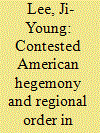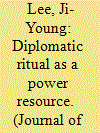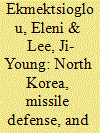|
|
|
Sort Order |
|
|
|
Items / Page
|
|
|
|
|
|
|
| Srl | Item |
| 1 |
ID:
152754


|
|
|
|
|
| Publication |
New York, Columbia University Press, 2016.
|
| Description |
xii, 286p.hbk
|
| Standard Number |
9780231179744
|
|
|
|
|
|
|
|
|
|
|
|
Copies: C:1/I:0,R:0,Q:0
Circulation
| Accession# | Call# | Current Location | Status | Policy | Location |
| 059040 | 327.5105/LEE 059040 | Main | On Shelf | General | |
|
|
|
|
| 2 |
ID:
165982


|
|
|
|
|
| Summary/Abstract |
Why did American-led postwar institution building lead to different types of security orders in Asia and Europe? The article investigates the failure of the Southeast Asia Treaty Organization (SEATO)—the only postwar multilateral security organization in the Asia-Pacific region that resembled NATO—as contrasted with NATO’s survival. Despite the popular notion of ‘American liberal hegemony’, the US-led multilateral security institution in fact faced serious resistance in Southeast Asia during the early years of the Cold War, as regional players viewed SEATO as yet another form of Western imperialism threatening their independence. The article makes a theoretical argument for the role of delegitimation in hegemonic order formation and shows that the Asian historical experience of Western colonialism had structural consequences for American-led hegemonic order building in Asia. China-India joint delegitimation strategies against the United States invoked local actors’ collective beliefs against colonialism portraying SEATO as a vehicle of Western domination. Once established, the United States’ European allies within SEATO placed constraints on the exercise of American hegemonic power, by taking advantage of the multilateral rules of SEATO and refusing to act collectively in the local crises in Laos. Archival evidence suggests that such delegitimation and restraint strategies were fairly successful in terms of limiting SEATO membership and blocking interventions in Indochina, strengthening Asian neutrality rather than creating a pro-US bloc in the region.
|
|
|
|
|
|
|
|
|
|
|
|
|
|
|
|
| 3 |
ID:
187470


|
|
|
|
|
| Summary/Abstract |
As the U.S.-China strategic rivalry has intensified, Washington has looked to its close allies and partners to counter Chinese clout in global technology leadership. With the Huawei ban as a proxy for the U.S.-China competition, the paper focuses on the concept of the alliance halo and analyzes how the three key U.S. allies in Asia—Australia, Japan, and South Korea—responded to Washington’s expectations of mutual support on the decoupling of Chinese technology companies from global supply chains. We argue that given that the Huawei ban is about future risks associated with China’s economy, as opposed to demonstrated military threats, it was more challenging to establish allied reliability within the U.S. alliance network as a whole. Our comparative analysis shows that Australia’s reactions have been the most direct, banning Huawei before the United States, showing a contrast with South Korea’s relatively muted responses. Japan’s decision to ban Huawei was as decisive as Australia’s but Tokyo sought to keep a low profile. Rather than the diplomatic pressure from the Trump administration, these allies’ varied responses resulted from their own assessments of security risks associated with Huawei.
|
|
|
|
|
|
|
|
|
|
|
|
|
|
|
|
| 4 |
ID:
121731


|
|
|
|
|
| Publication |
2013.
|
| Summary/Abstract |
What explains Korea's success in surviving as an independent state for over 2,000 years, not annexed to China, when it shares a border with this powerful imperial neighbor? I argue that diplomatic ritual can be conducive to managing asymmetric power relations and that the Korean state and the Chinese state prior to the nineteenth century used the diplomatic ritual of investiture in a strategic manner as a signaling mechanism to manage the expectations of each side. Drawing insights from ritual studies, I offer three specific mechanisms: (1) regularity and precision, (2) strategic ambiguity, and (3) the manipulation of symbols, through which the ritualization of power relations reduces the tension arising from the disparity in power. The empirical evidence comes from an investigation of a total of sixteen investiture cases between Choso n Korea and Ming China between 1392 and 1644. It shows that the granting and seeking of investiture on both sides was not only a way of signaling their commitment to the status quo, but also a medium of negative soft power through which the stronger side could change the status quo relations to its favor using the symbolic power embedded in the investiture ritual.
|
|
|
|
|
|
|
|
|
|
|
|
|
|
|
|
| 5 |
ID:
148451


|
|
|
|
|
| Summary/Abstract |
Some argue a powerful China will likely reestablish a Sinocentric tribute system in pursuit of hegemony in Asia. This line of argument, however, rests on misleading images of the Chinese empire while assuming hegemony is a product of a single agent and its activities. But, why do actors comply with, defy, or challenge hegemonic authority? I argue hegemony is not just an outcome of the material power of the preponderant state, but is constructed in interaction with other actors’ pursuit of domestic legitimation. The tribute system and Chinese hegemony in early modern East Asia were built on symbolic domination—Chinese views of how international politics should work determined what was socially acceptable and legitimate while regulating the range of choices other actors could make due to domestic consequences. It shows that crafty political leaders engaged in a form of symbolic politics that manipulated external recognition from the hegemon, but in ways that strengthened their positions against domestic opponents.
|
|
|
|
|
|
|
|
|
|
|
|
|
|
|
|
| 6 |
ID:
185984


|
|
|
|
|
| Summary/Abstract |
This article examines the relationship between US missile defense and the US-China security dilemma dynamics by developing the concept of diffuse signaling involving the Korean peninsula. We argue that the US’ efforts to bolster deterrence against North Korea’s growing threats through missile defense have resulted in China’s countermeasures of enhancing survivability and penetrability of its second-strike capability, leading to downward spirals of tensions between Beijing and Washington. We explain how three structural factors – geography, the US alliance system, and nuclear asymmetry – have made diffuse signaling salient, thus making it very challenging for the United States to reassure China even when its actions targeted North Korea. The article empirically shows the action-reaction process through which China and the US have come to experience the aggravation of the security dilemma over the Korean peninsula.
|
|
|
|
|
|
|
|
|
|
|
|
|
|
|
|
|
|
|
|
|